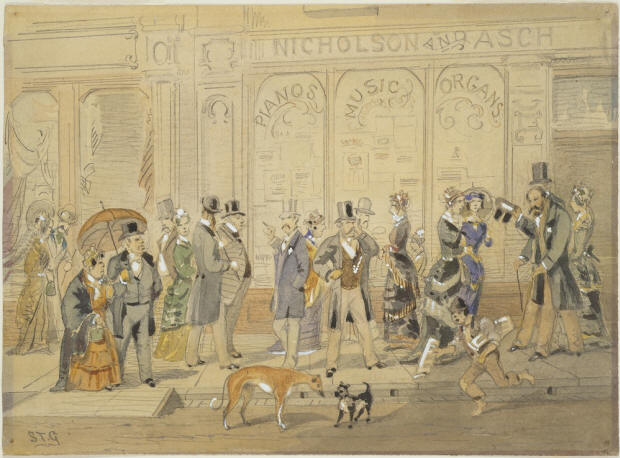Block Arcade
280-286 Collins Street, Melbourne
The place to be seen in Melbourne in the 1880s and 1890s was
'The Block' (just up from 'The Lane'). A colourful description can be found
in Fergus Humes' novel The Mystery of a Hansom Cab.
"It was Saturday morning, and fashionable Melbourne was "doing the
Block". Collins Street is to the Southern city what Bond Street and the
Row are to London, and the Boulevards to Paris.
It is on the Block that people show off their new dresses, bow to
their friends, cut their enemies, and chatter small talk. The same thing
no doubt occurred in the Appian Way, the fashionable street of Imperial
Rome, when Catullus talked gay nonsense to Lesbia, and Horace received
the congratulations of his friends over his new volume of society
verses. History repeats itself, and every city is bound by all the laws
of civilisation to have one special street, wherein the votaries of
fashion can congregate.
Collins Street is not, of course, such a grand thoroughfare as
those above mentioned, but the people who stroll up and down the broad
pavement are quite as charmingly dressed, and as pleasant as any of the
peripatetics of those famous cities. As the sun brings out bright
flowers, so the seductive influence of the hot weather had brought out
all the ladies in gay dresses of innumerable colours, which made the
long street look like a restless rainbow.
Carriages were bowling smoothly along, their occupants smiling and
bowing as they recognised their friends on the side walk. Lawyers, their
legal quibbles finished for the week, were strolling leisurely with
their black bags in their hands; portly merchants, forgetting Flinder's
Lane and incoming ships, walked beside their pretty daughters; and the
representatives of swelldom were stalking along in
their customary
apparel of curly brimmed hats, high collars, and immaculate suits.
Altogether, it was a pleasant and animated scene, which would have
delighted the heart of anyone who was not dyspeptic, or in
love--dyspeptic people and lovers (disappointed ones, of course) being
wont to survey the world in a cynical vein."
S. T. Gill also left us a
wonderfully evocative painting of the scene some 15 years earlier.

It was fashionable to "do the Block" between 2.30 and 4.30 - particularly
if you were on the lookout for any eligible beau. On Saturdays, this took
place somewhat earlier because of the footy.
The queen of the block is undoubtedly The Block Arcade.
From 1856 to 1883 the site was occupied by Briscoe's Grain Bulk Store.
This later became the site for George & Georges Drapers until the
catastrophe of 14th September 1889. A fire swept through the building. Three
firemen died fighting the fire and 200,000 pounds damage was caused.
George's (until its recent closure Melbourne's most
exclusive department store) was forced to move further up Collins Street.
A group of businessman, realising the value of this site in the middle of
The Block, commissioned the architect David C. Askew to construct a shopping
arcade on the site. The L-shaped structure with identical facades in Collins
and Elizabeth Streets was loosely based on the Galleria Vittoria in Milan.
Like many Melbourne buildings, the previous grain store was built on
bluestone foundations. Melbourne could well be described as 'the bluestone
city'. The disastrous fire could not destroy the bluestone foundations, and
the lavish new arcade grew on top of the old foundations despite the
deepening economic depression. It was built in two sections between 1891 and
1893.
The result represents the apogee of fashionable and cultured shopping in
Melbourne.
Today, window shopping in the Block Arcade (and not spending a
cent) is one of the 100 Great Things to do in Melbourne for under $10.
___________________
 ___________________
___________________